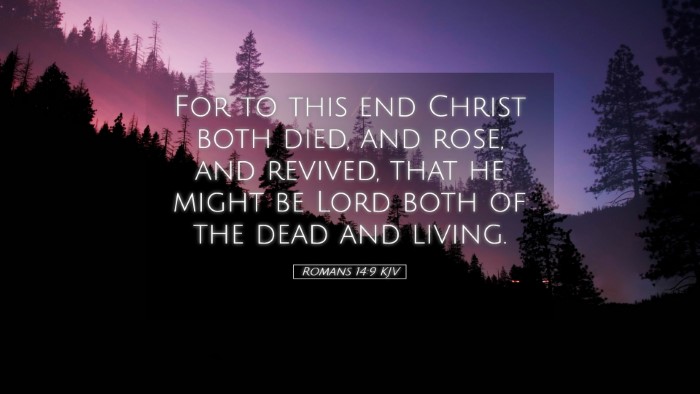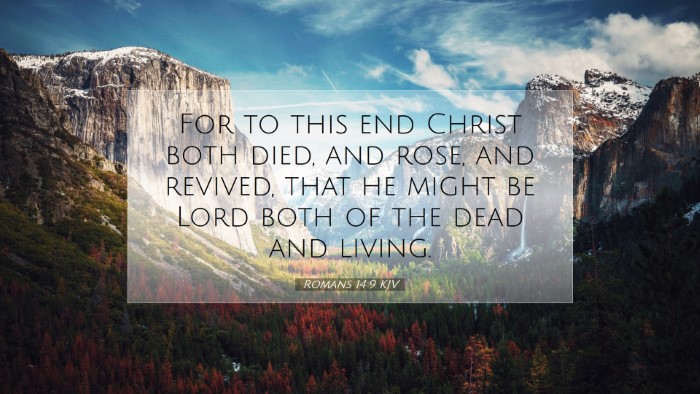Old Testament
Genesis Exodus Leviticus Numbers Deuteronomy Joshua Judges Ruth 1 Samuel 2 Samuel 1 Kings 2 Kings 1 Chronicles 2 Chronicles Ezra Nehemiah Esther Job Psalms Proverbs Ecclesiastes Song of Solomon Isaiah Jeremiah Lamentations Ezekiel Daniel Hosea Joel Amos Obadiah Jonah Micah Nahum Habakkuk Zephaniah Haggai Zechariah MalachiRomans 14:9
Romans 14:9 KJV
For to this end Christ both died, and rose, and revived, that he might be Lord both of the dead and living.
Romans 14:9 Bible Commentary
Commentary on Romans 14:9
Verse Reference: Bible Verse: Romans 14:9
"For to this end Christ both died, and rose, and revived, that he might be Lord both of the dead and living."
Introduction
This verse encapsulates a significant theological truth regarding the supremacy of Christ over death and life. The Apostle Paul writes this epistle to address issues within the Roman church, especially concerning Christian liberty and the perspective on dietary laws and observances.
Theological Insights
-
Christ's Death and Resurrection
Paul emphasizes the dual aspects of Christ's work: His death and resurrection. These events are pivotal in Christian theology, establishing Jesus as the Messiah who conquers death.
According to Matthew Henry's Commentary, the death of Christ not only serves as atonement but also as a demonstration of God's profound love and justice. The resurrection signifies the victory over sin and provides assurance of eternal life.
-
Lordship of Christ
Paul states Jesus is "Lord both of the dead and living," indicating His authority extends beyond the grave. As per Albert Barnes, this asserts that Christ governs all, including those who have died before his coming and those alive. This universal reign is a source of comfort for believers.
-
Implications for Believers
Understanding Christ’s lordship encourages Christians to live in a manner that honors God in all aspects of life. As Adam Clarke points out, acknowledging Christ’s authority should guide the behavior of believers, particularly in matters of conscience regarding disputable issues.
Practical Applications
-
Unity in Diversity
In the context of Romans 14, Paul urges believers to accept one another despite differing practices regarding food and holy days. This speaks to the need for unity within the church, created through shared faith in Christ’s sacrificial work.
-
Living for Christ
Paul’s statement encourages believers to live their lives in acknowledgment of the risen Christ's authority. This may involve setting aside personal freedoms for the sake of others’ spiritual health, a theme that resonates throughout Romans 14.
-
Embracing Accountability
As the living and dead are both under Christ’s lordship, it brings a solemn reminder of accountability to Him. The implications of this lordship should encourage a life that reflects the teachings of Christ and a commitment to mutual support among believers.
Conclusion
Romans 14:9 serves as a profound reminder of the core truths of the gospel—the death, resurrection, and lordship of Christ. For pastors, theologians, and students of the Bible, this verse encourages a deeper understanding of Christ’s authority and should inspire a commitment to live lives reflective of His love and grace. Emphasizing unity amongst diversity and the need for accountability, it challenges believers to support one another in faith as they navigate the complexities of faith and practice.


